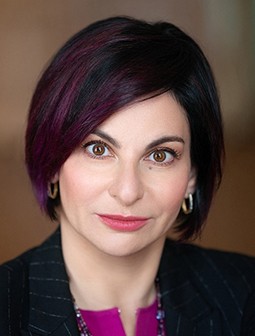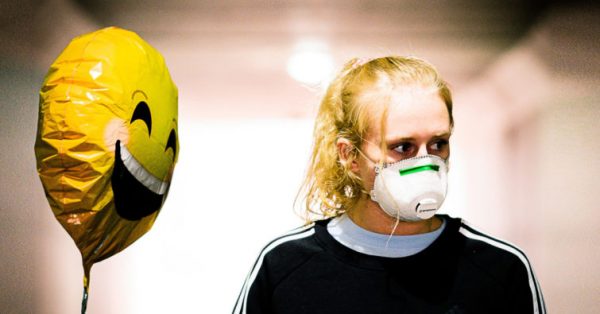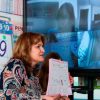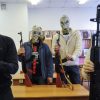 The daily increase in coronavirus cases in Russia has exceeded 9 thousand people. What worries us most is whether a new self-isolation regime will begin. The schoolchildren have their holidays extended, and some classes have already been quarantined. And no one knows when the epidemiological situation will change for the better. Psychologist Anna Khasina told Pravmir how the spring lockdown changed us, what awaits people during the second wave of the pandemic and why it is normal to feel irritated now.
The daily increase in coronavirus cases in Russia has exceeded 9 thousand people. What worries us most is whether a new self-isolation regime will begin. The schoolchildren have their holidays extended, and some classes have already been quarantined. And no one knows when the epidemiological situation will change for the better. Psychologist Anna Khasina told Pravmir how the spring lockdown changed us, what awaits people during the second wave of the pandemic and why it is normal to feel irritated now.
– Deep down, we all hoped that there would be no second wave. But it’s already here. And now we roughly understand what can await us. Is it good or, on the contrary, bad for us psychologically?

Anna Khasina
– This is very bad. When there was the first wave, everything went according to the Kubler-Ross model: first shock, denial, then aggression (“the isolation was invented by the evil enemies, why are we locked here?”); then bargaining (“Can we go out for a little bit? And if in a mask? And if with a dog?”); then depression (“Lord, we’re all going to die here”). Then acceptance came: we adapted to the idea that we had to mobilize for a while, but that would end and we would return to normal life.
Now it turns out that normal life has not completely returned. The Mayor of Moscow signed a decree that children go on vacation for two weeks. This affects my life extremely negatively, as well as the lives of many people. These are very unpleasant changes, similar to how it was earlier, but without emotional uplift: we will now rally as a united front and defeat the heinous infection, will defeat coronavirus.
It turns out that there is no feeling of cohesion, unity, significance (you make your contribution, at least sitting at home), but there are limitations. This has a very negative effect on the psyche.
Besides, just now the distant consequences of the previous wave are coming. The World Health Organization has warned that up to 50% of physicians will experience symptoms of PTSD. It can be assumed that a significant number of people who survived the pandemic, regardless of whether they were sick or not, will also have post-traumatic stress disorder from such dramatic changes in life.
And this PTSD has new limitations. In everyday life, we are simply faced with endless irritability and unmotivated aggression of the people around us. Someone is better in control, someone is worse, but everyone is very annoyed.
The Virus Is Hard to Hate, So They Get Angry with People
People are tired of being afraid: this is what we have heard in the last months of self-isolation. What about those who ignore the danger of the virus and even oppose restrictive measures?
– Now there is a polarization of society into, relatively speaking, more obedient and more revolutionary minded.
Six months ago, the enemy was the one who did not wear a mask. In fact, the enemy, of course, was a virus, but the property of the human psyche is that we hate “someone”, not “something.” The virus is impossible to see and hard to hate. We are looking for enemies among people like us.
Who is the enemy now? Previously, those who followed the rules could identify themselves as “good”, “correct” citizens. Six months have passed, and we see that the virus has spread anyway, regardless of our compliance with the rules and restrictions.
Without positive reinforcement, the motivation to comply with safety requirements falls. To be honest, now it tends to zero.
In medicine, there is a concept: tropism (preference, craving for something, compatibility with something. – Ed. note). We are now very prone to any irritants, we feel them very keenly. Plus, there is still the “eternal desire of the Russian intelligentsia” to answer two questions: who is to blame and what to do. Who’s guilty? For example, those who went to Sochi, Turkey did not follow the mask regime enough. We look for the culprit to defend ourselves against the thought: new restrictions will again not help.
– Can we say that this time there will be less fear and panic because of this general fatigue?
– Perhaps yes, we can, but there will be more resistance to restrictions.
On the one hand, it is good that there will be less fear and panic: they have an extremely destructive effect on both the psyche and the body. Sometimes stress-related illnesses emerge immediately or after three to six months. Six months have passed since the beginning of the epidemic, and doctors are faced with a huge number of manifestations of chronic diseases, dermatological problems, problems with the gastrointestinal tract, with the psyche…
We hope that there will be less panic, as well as these stress-related disorders. On the other hand, panic will decrease due to more resistance and negativism, that is, the level of aggression will increase.
If we were considering some laboratory case, and not talking about real life in Russia, I would say that the situation “less fear, more aggression” is good. There is a lot of energy in aggression, while fear and panic are exhausting conditions. But since we are in real life, an increase in the level of aggression is bad. Because when there is a lot of aggressive energy, it has to pour out somewhere. In a fight against something, for example.
– By the way, let’s talk about a fight. Now there are protests all over the world, and anti-vaccines are joining the anti-mask. People say that they are not against masks, they want to regain the freedom to walk as they want and where they want. Why did the mask become the symbol of this fight against restrictions?
– We can understand people. They are worried that the mask affects everyone, regardless of gender, age, social status. They are told in every store: “Put on a mask, then I will sell you bread.” Many people think that a mask is uncomfortable, it causes discomfort. Some even see a symbolic meaning: as if the man in the mask is gagged.
– What about bans? Are we ready to lock ourselves at home again in the near future, given that not everyone even wears masks in the subway?
– Without strict restrictive measures, it will not work to close people at home. And when deciding on these measures, it is important to take into account the balance of benefits and harms. In this case, there are health benefits, but also harm to social tension.
Imagine that now the authorities have introduced the same strict measures as last time. Last time, we were ready to endure restrictions to contain the epidemic, but this did not happen. Now we are in a completely different emotional state, and there will be many times more resistance to restrictive measures.
Focus on Small Things and Do Not Read the News
– What advice would you give to people who are now thinking: “Well, that’s it, if I have to stay locked up for another three months, I will definitely go crazy.”
– It is important to support yourself in the long term. Covid is really scary. This is some kind of incomprehensible invisible thing, and the most terrible and destructive for the psyche is to fight an invisible enemy.
If we really hate, then it is important for us to hate someone specific. The virus is invisible, intangible, we can only trust the doctors or the authorities who say that if you do certain procedures, you will not face this enemy. But the practice of the current year showed that we still met with him, maybe not personally each of us, but nevertheless we did.
This is truly very disturbing, destructive and exhausting for the psyche: to sit and be afraid of an invisible enemy, who either comes or does not come.
A vaccine appears in some form, but how effective it is is not yet clear. There is basically nothing you can do to defend yourself. Advice like “you should stay at home, wash your hands more often and wear a mask” is no longer comforting.
Therefore, you need to support yourself. Focus on the little things we can do not to protect ourselves from the virus, but to support ourselves in these uncertain conditions. This is the work on increasing stress resistance, which, in principle, needs to be carried out, regardless of the pandemic: to establish social ties, maintain them, monitor somatic and mental health. To sleep, eat, walk as long as possible, maintain physical activity. That is, to do everything in our power so that our body, and therefore our spirit, were in a prosperous state.
There is a study on the connection between a depressed psycho-emotional state and a decrease in the body’s defenses. A person in a positive, prosperous emotional state is more stable both mentally and physically.
Concentration camp prisoners wrote in their memoirs that in this completely uncertain environment, when you have no influence on anything, and your life is in danger every second and is not worth anything, it is very important to focus on what you can do. This is about freedom of choice, about the feeling that a person is not a victim, he can control at least a small part of his life.
– What rules of psychohygiene would you advise those who are now reading the news about an increase in morbidity and panicking?
– Do not read in any case. My previous interview was called: “I beg you, do not read the news.” I keep pleading with you to do the same. Negative information will find you on its own. No new information has come out. We do not know anything fundamentally new either about the virus or about the treatment. Reading and studying in detail will not help us in any way.
But it will cause significant psychological harm, because we are very upset and scared. And to be frightened in connection with issues on the solution of which we have no influence is very bad for the psyche. Therefore, I again propose to focus on what we can do: take care of ourselves, about loved ones, about health, engage in self-development, if there is strength for this.
– There are people who are now afraid of everything: getting infected, infecting loved ones and strangers, grabbing the door handle, talking to a person in the store, making an appointment. How can they figure out where there is objective compliance with safety rules, and where not, and whether it is necessary to seek help. How to get back to normal life?
– You need to think about whether you are worried so that it prevents you from living a normal life.
Sleep quality is the main differentiating criterion, because when people are anxious, it is reflected in their sleep. It is worth worrying, for example, if you don’t sleep: you fall asleep with difficulties, wake up at dawn, wake up anxiously in the middle of the night and feel overwhelmed in the morning and cannot function normally in life and at work. This is a clear reason to consult either a doctor or a psychologist.
There may be a reverse situation: very high sleepiness, when a person sleeps for nine hours, but still does not get enough sleep and falls asleep by the middle of the day. This is also an indicator of a vulnerable state of mind.
I want to emphasize that a psychologist or a therapist is not the last step, this is the first thing to do. There is absolutely no task here to cope on your own, and timely seeking help is a correct and responsible action.
– The doctors had several months to catch their breath, but now the load on them is increasing again. What is their psychological state, how ready are they to mobilize again and work 12 hours in personal protective equipment?
– This is the most painful question. The psychological state of doctors is very grave. It is better where there are good teams, where the head physician provided support, staying together with his colleagues. That is, social support from medical colleagues turned out to be the most powerful factor in preventing psychological destruction.
Those collectives, where this did not happen, came up to October in a mentally ruined state. They simply will not stand the second wave with PPE and so on. I know that in Moscow, for example, the financial compensation to doctors in the red zone is quite high, and this was one of the reasons why the doctors continued to work. But no money can compensate for psycho-emotional stress and destruction.
In May, an article was published by Sergei Sergeevich Petrikov (Chief Physician of the Sklifosovsky Research Institute. – Ed. note), Professor Kholmogorova (Doctor of Psychology Alla Kholmogorova. – Ed. Note.) and several other authors. At the Sklifosovsky Research Institute, they did a study of the level of stress and burnout. According to their data, the level of anxiety was 100%, the level of suicidal preparedness was 10%. This is an off-scale high figure, five times higher than the average for the population. This, I want to emphasize, was in May. It will get worse now.
We Became More Conscious Because We Are Afraid
– In general, we began to pay more attention to the health of others. Nowadays, a person sneezing and sniffing on a bus or in a store evokes negative emotions. Is this normal? It turns out that a new type of discrimination against people has appeared.
– We are not talking about discrimination, we are rather talking about alertness. This is a very natural development of events. For example, all governments and ministries of health in the world are struggling to develop cancer alertness, because in general we are extremely neglecting our health. And if the pandemic helps us to be more responsible about our health, then generally speaking, this is good.
– If you try to look for the positive in this whole story, you can dream up and imagine that as a result we will be more attentive to our health. For example, not going to work with a fever, although this was not uncommon before the pandemic. Do you think this might be true? Or as soon as the virus will be defeated, people will simply forget about everything?
– It’s all subject to the law of normal distribution. Most people will be more wary and won’t forget because, as you said, they will be controlled by their social environment. There is an insignificant part of people who are not affected by anything, no virus, they are acting as they used to act before.
But basically, we have become more focused on our own health, and the number of those who go to the office with a fever or send a child with snot to the kindergarten have really decreased. Again, unfortunately, this is balanced with anxiety. That is, the point is not that we have become so conscious, but that we are afraid.
Most likely, if this is not supported in a special way, it will go away by itself. But will live like this for some time, about a year. Now, for example, there is a wave of seasonal flu. My sample is small, this is not a full-fledged study, but an observation: among my acquaintances, a significantly larger number of people are actively looking for an opportunity to get vaccinated, and this is very good.
Translated by Alyona Malafeeva

















